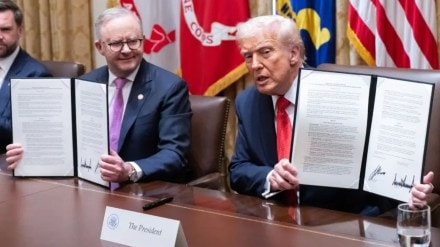US President Donald Trump and Australian Prime Minister Anthony Albanese singed an $8.5 billion rare earths deal at the White House on Monday, in an effort to reduce reliance on Chinese supply chains. Yet, it wasn’t the signing ceremony but Trump’s offhand quip to Australian Ambassador Kevin Rudd that became the talking point of the day.
Trump jokes with Kevin Rudd
Back in 2021, Rudd slammed Trump as a “village idiot,” and the “most destructive president in history.” When a reporter brought up Rudd’s past remarks, Trump turned to Prime Minister Anthony Albanese and asked with a grin, “Did an ambassador say something bad about me? Where is he? Is he still working for you?” Spotting Rudd across the table, Trump pressed, “You said bad?”
Rudd started to respond, “Before I took this position, Mr. President…”, but Trump stopped him in the middle. “I don’t like you either. I don’t. And I probably never will,” he said, before moving on to another question. The room broke into awkward laughter over Trump’s blunt response.
The moment came right after Trump and Albanese signed an agreement to boost cooperation on mining and processing rare earths. These are key materials used in everything from smartphones to fighter jets. Together, the two nations pledged over $2 billion in new investments. “We are discussing critical minerals and rare earths and we are going to be signing an agreement that’s been negotiated over a period of four or five months,” Trump said during their meeting at the White House Cabinet Room. “In about a year from now, we’ll have so much critical mineral and rare earths that you won’t know what to do with them.”
China currently controls around two-thirds of the world’s rare-earth mining and nearly 90% of processing. The new US-Australia agreement is aimed at streamlining mining permits, introducing “price floors” to prevent market manipulation, and encouraging joint investments in key projects. The meeting was Albanese’s first visit to the White House since Trump returned to power.
Reducing China’s dominance in supply chains
China’s recent decision to impose new export restrictions on rare earth materials has negatively impacted the global markets. US Treasury Secretary Scott Bessent said last week that the US and its allies were exploring a balanced response to the measures.
Australia currently holds the world’s fourth-largest deposits of rare earths and has often tried to position itself as a reliable alternative to China for key materials used in semiconductors, defense systems, and renewable energy technologies. The country is also home to Lynas Rare Earths Ltd, the only producer of heavy rare earths outside China.
Despite the new deal and friendly gesture, Trump gave no indication that Australia would receive tariff relief. Canberra has long asked for a review of US tariffs, arguing that it runs a trade deficit with Washington. “Australia pays very low tariffs — very, very low tariffs,” Trump said earlier, showing little willingness to make concessions.
For months, some in Republican circles believed that Trump had iced out Kevin Rudd, given his habit of holding grudges, and maybe even Australia, from his diplomatic circle. But if there was any bad blood, Trump didn’t let it show on Monday.
